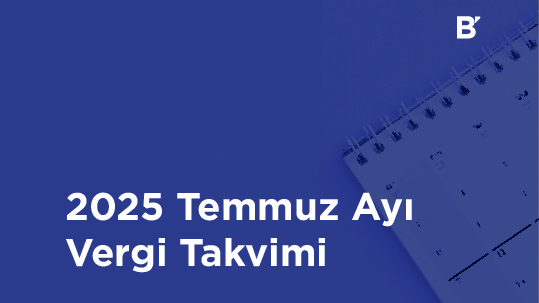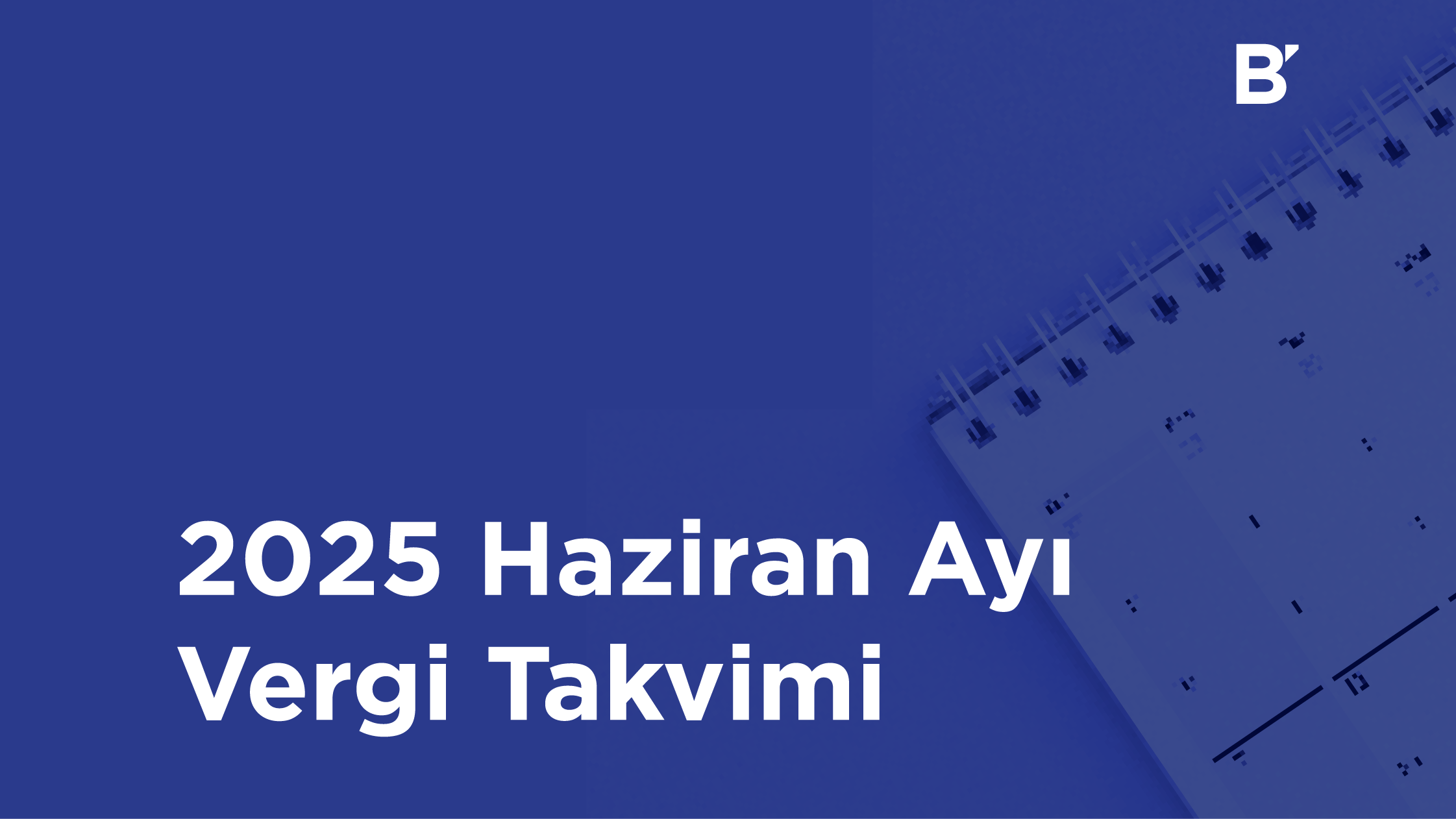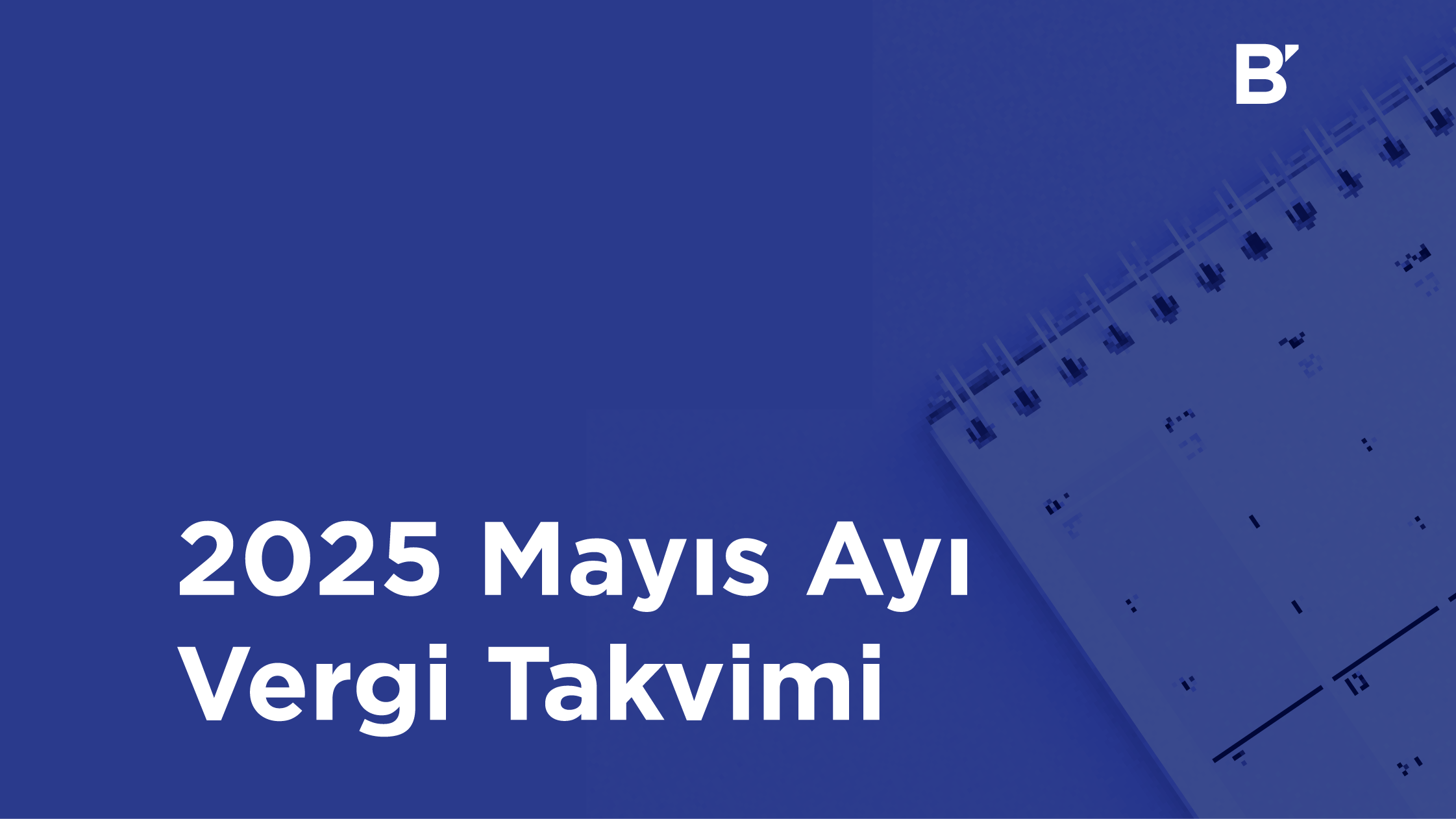03.07.2024/30
Mali Tatil 1 Temmuz’da Başladı
5604 sayılı Mali Tatil İhdas Edilmesi Hakkında Kanuna göre her yıl temmuz ayının birinden yirmisine kadar (yirmisi dahil) malî tatil uygulanır.
Mali tatil uygulamasına ilişkin açıklamalar Mali Tatil Uygulaması Hakkında Genel Tebliği’de yer almaktadır. Söz konusu mevzuat gereğince mali tatil süresince bazı muhasebe ve vergi uygulamalarına ilişkin önemli hususlar aşağıda yer almaktadır.
1. Mali tatil kapsamında olmayan vergiler
- Özel tüketim vergisi,
- Banka ve sigorta muameleleri vergisi,
- Özel iletişim vergisi,
- Şans oyunları vergisi ile
- Gümrük idareleri, il özel idareleri ve belediyeler tarafından tarh ve/veya tahsil edilen vergi, resim ve harçlar (ithalde alınan katma değer vergisi, emlak vergisi, çevre temizlik vergisi gibi)
hakkında mali tatil uygulanmayacaktır.
2. Mali tatil nedeniyle uzayan süreler
Son günü mali tatile rastlayan aşağıda belirtilen süreler, mali tatilin son gününü izleyen tarihten itibaren yedi gün uzamış sayılacaktır.
2.1 Beyana dayalı tarhiyatta, kanuni süresinde verilmesi gereken beyannamelerin verilme süreleri
Tebliğin “Diğer hususlar” başlıklı (10) numaralı bölümünde belirtilenler hariç olmak üzere, beyanname verme süresinin son günü mali tatil süresi içerisinde kalan vergi, resim ve harçlara ilişkin beyannamelerin verilme süreleri, mali tatilin son gününü izleyen tarihten itibaren yedi gün uzayacaktır.
2.2 İkmalen, re’sen veya idarece yapılan tarhiyatta, vadesi mali tatile rastlayan vergi, resim ve harçlar ile vergi cezaları ve gecikme faizlerinin ödeme süresi
213 sayılı Vergi Usul Kanununun 112 nci maddesine göre ikmalen, re’sen veya idarece tarh olunan vergiler taksit zamanlarından evvel tahakkuk etmişse taksit süreleri içinde; taksit süreleri kısmen veya tamamen geçtikten sonra tahakkuk etmişse; geçmiş taksitler, tahakkuk tarihinden itibaren bir ay içinde ödenir.
İkmalen, re’sen veya idarece yapılan ve yargı organlarına intikal etmiş olan tarhiyatlarda ise yargı organlarınca tasdik veya tadilen tasdik edilen tutarların ödeme süresi, “Vergi Mahkemesi/Bölge İdare Mahkemesi/Danıştay Kararına Göre Vergi/Ceza İhbarnamesi (Bildirim)”nin mükellefe tebliğ tarihinden itibaren bir aydır.
5604 sayılı Kanunun 1 inci maddesinin (2) numaralı fıkrasının (b) bendine göre, ikmalen, re’sen veya idarece yapılan tarhiyata ilişkin olup vadesi mali tatile rastlayan vergi, resim ve harçlar ile vergi cezaları ve gecikme faizlerinin ödeme süresi, mali tatilin son gününü izleyen tarihten itibaren yedi gün uzamış sayılacaktır.
2.3 Tarh edilen vergilere ve/veya kesilen cezalara karşı uzlaşma talep etme veya cezada indirim hükümlerinden yararlanmak amacıyla yapılacak başvurulara ilişkin süreler
İkmalen, re’sen veya idarece yapılmış olan tarhiyatlara karşı mükelleflerin uzlaşma talep etme veya cezada indirim talebinde bulunma süresi, vergi/ceza ihbarnamesinin tebliğ tarihinden itibaren 30 gündür. Başvuru süresinin son gününün mali tatile rastlaması halinde söz konusu süre, mali tatilin son gününü izleyen tarihten itibaren yedi gün uzamış sayılacaktır.
Dileyen mükelleflerin, adlarına tarh edilen vergi ve kesilen cezalara karşı mali tatil süresi içinde de uzlaşma veya cezada indirim talebinde bulunabilmesi mümkündür.
2.4 Devamlı bilgi verme hükümleri kapsamında verilmesi gereken bilgilerin verilmesine ilişkin süreler
Kamu idare ve müesseseleri (Kamu hizmeti ifa eden kurum ve kuruluşlar dahil) ile gerçek ve tüzel kişilerden Bakanlığımızca yapılan düzenlemeler çerçevesinde veya re’sen, vergilendirmeye ilişkin olaylarla ilgili olarak Bakanlığımızca veya vergi dairesince devamlı bilgi verme çerçevesinde istenecek bilgilerin verilmesine ilişkin sürenin son gününün mali tatile rastlaması halinde anılan süre, mali tatilin son gününü izleyen tarihten itibaren yedi gün uzamış sayılacaktır.
3. Mali tatil nedeniyle işlemeyen süreler
5604 sayılı Kanunun 1 inci maddesinin (3) numaralı fıkrasında, “Vergi Usul Kanunu hükümlerine göre belirli sürelerde yapılması gereken muhasebe kayıt süreleri, bildirim süreleri ve vergiyle ilgili işlemlere ilişkin dava açma süreleri malî tatil süresince işlemez. Belirtilen süreler malî tatilin bitiminden itibaren tekrar işlemeye başlar.” hükmüne yer verilmiştir.
Mali tatil süresince işlemeyen süreler aşağıda yer almaktadır:
- Muhasebe kayıt süreleri
- Bildirim süreleri
- Dava açma süreleri (Mali tatil nedeniyle uzayan dava açma süresinin son gününün 2577 sayılı İdari Yargılama Usulü Kanunu uyarınca çalışmaya ara verme süresine rastlaması durumunda ise dava açma süresi, çalışmaya ara vermenin sona erdiği günü izleyen günden itibaren yedi gün uzayacaktır.)
4. Mali tatil süresince defter ve belgelerin ibrazı, vergi incelemesine başlama
5604 sayılı Kanunun 1 inci maddesinin (4) numaralı fıkrasında, “Mahkeme kararı veya Cumhuriyet Savcılıklarının talebi üzerine ya da Vergi Usul Kanunu hükümlerine göre yapılan aramalı incelemeler hariç olmak üzere, malî tatil süresince inceleme amacıyla defter ve belgelerin ibrazı talep edilemez, mükellefin işyerinde incelemeye başlanılmaz.” hükmüne yer verildiğinden, mali tatil süresince (fıkrada yer alan haller dışında) mükellefin işyerinde incelemeye başlanılmayacak ve inceleme amacıyla defter ve belgelerin bu süre içinde ibrazı istenilmeyecektir.
Mali tatil süresinden önce başlanılmış olan bir incelemeye bu süreden önce ibraz edilen defter-belge üzerinde devam edilebilecek; ancak, bu süre zarfında mükelleften ilave defter, belge ve bilgi talep edilemeyecek, mükellef veya vergi sorumlusu, inceleme sonucunda yapılacak tespitlerin yer aldığı tutanağı imzalamaya davet edilemeyecektir.
Öte yandan, vergi inceleme elemanları tarafından mali tatil süresinden önce yapılan tebligat ile mükelleften defter ve belgelerinin ibrazının talep edilmesi ve söz konusu talebe ilişkin olarak da mükellefe tanınan sürenin son gününün mali tatile rastlamış olması halinde, bu sürenin mali tatilin son gününü izleyen tarihten itibaren 7 gün uzamış sayılması uygun görülmüştür.
5. Mali tatil süresince bilgi isteme ve tebligat işlemleri
5604 sayılı Kanunun 1 inci maddesinin (5) numaralı fıkrasında, “Tatil süresince, vergi ve ceza ihbarnameleri ile mahsup taleplerine yönelik olanlar hariç, bilgi isteme talepleri mükelleflere, vergi ve ceza sorumlularına bildirilmez. Ancak tatil süresi içinde gerçekleşen tebligat işlemlerinde süre, malî tatilin son gününden itibaren işlemeye başlar.” hükmü yer almaktadır.
Söz konusu fıkra hükmüne göre vergi/ceza ihbarnameleri mali tatil süresi içinde mükellefler ile vergi ve ceza sorumlularına bildirilmeyecek; tatil süresi içinde gerçekleşen tebligat işlemlerinde ise süre mali tatil süresince işlemeyecektir.
İkmalen, re’sen veya idarece yapılmış olan tarhiyatlara karşı mükelleflerin kendilerine tanınan yasal haklardan (dava açma, cezada indirim ve uzlaşma talep etme) herhangi birini kullanma süresi bu tarhiyatlara ilişkin vergi/ceza ihbarnamesinin tebliğ tarihinden itibaren 30 gün olup, tebligatın mali tatil süresi içinde yapılması halinde süre, mali tatilin son gününden itibaren işlemeye başlayacaktır.
6. Mali tatilin sona erdiği günü izleyen beş gün içinde biten kanuni ve idari süreler
6661 sayılı Kanun ile 5604 sayılı Kanunun 1 inci maddesinin altıncı fıkrasında yer alan hüküm, “Malî tatilin sona erdiği günü izleyen beş gün içinde biten bu madde kapsamındaki kanuni ve idari süreler, malî tatilin son gününü izleyen tarihten itibaren beşinci günün mesai saati bitiminde sona ermiş sayılır.” şeklinde değiştirilmiştir.
Söz konusu hükme göre, mali tatilin sona erdiği günü izleyen beş gün içinde biten kanuni ve idari süreler, tatilin son gününü izleyen tarihten itibaren beşinci günün mesai saati bitiminde sona erecektir.
7. Beyanname verme süresi mali tatil nedeniyle uzamış olan vergilerde ödeme süresi
Beyana dayanan ve beyanname verme süresi malî tatil nedeniyle uzamış olan vergilerde ödeme süresi (aynı ay içerisinde kalmak kaydıyla), uzayan beyanname verme süresinin son gününü izleyen günün mesai saati bitimine kadar uzamış sayılır.
























